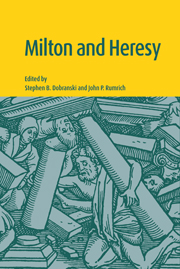Book contents
- Frontmatter
- Contents
- List of contributors
- Acknowledgments
- Abbreviations
- Introduction: Heretical Milton
- PART I HERETICAL THEOLOGY
- PART II HERESY AND CONSEQUENCES
- PART III HERESY AND COMMUNITY
- 7 Licensing Milton's heresy
- 8 Milton and the rationale of insulting
- 9 Treason against God and state: blasphemy in Milton's culture and Paradise Lost
- 10 The politics of performance in the inner theater: Samson Agonistes as closet drama
- PART IV READERS OF HERESY
- Index
9 - Treason against God and state: blasphemy in Milton's culture and Paradise Lost
Published online by Cambridge University Press: 10 October 2009
- Frontmatter
- Contents
- List of contributors
- Acknowledgments
- Abbreviations
- Introduction: Heretical Milton
- PART I HERETICAL THEOLOGY
- PART II HERESY AND CONSEQUENCES
- PART III HERESY AND COMMUNITY
- 7 Licensing Milton's heresy
- 8 Milton and the rationale of insulting
- 9 Treason against God and state: blasphemy in Milton's culture and Paradise Lost
- 10 The politics of performance in the inner theater: Samson Agonistes as closet drama
- PART IV READERS OF HERESY
- Index
Summary
During the upheavals of the English Revolution, the offense of blasphemy was closely linked with heresy and seemed horrifying to godly Puritans who feared religious division and radical sectarianism. Considered the most execrable kind of behavior and verbal offense, blasphemy became an intensely politicized issue, illustrating the intersection of religion and politics and their relation to threatening forms of linguistic and symbolic expression. In 1648 the Presbyterian Parliament issued a fierce Ordinance aimed at “the preventing of the growth and spreading of Heresie and Blasphemie” (including antitrinitarianism); and then in 1650 the Purged Parliament issued a strict Blasphemy Act which, perhaps surprisingly, the theologically radicalized Milton himself would recall in A Treatise of Civil Power in Ecclesiastical Causes (1659) as “that prudent and well deliberated act.” In the language of that Act, first issued to restrain the flamboyant behavior and writings of the Ranters, “Blasphemous and Execrable Opinions” threatened to subvert established authority and were considered “derogatory to the honor of God, and destructive to humane Society.” Thus the notorious Ranter Abiezer Coppe, having shocked godly Puritans with his eccentric visionary writings proclaiming that sin and transgression were finished, observed that he had been prosecuted and imprisoned “for suspition of Blasphemie and Treason against the State.”
The famous episode of the charismatic Quaker leader James Nayler, who “acted the part of Christ at Bristol” likewise illustrates how intensely controversial the offense could become for Milton's contemporaries and how it could indeed acquire the most urgent political ramifications – as a subversive deprecation of both God and state.
- Type
- Chapter
- Information
- Milton and Heresy , pp. 176 - 198Publisher: Cambridge University PressPrint publication year: 1998
- 1
- Cited by

